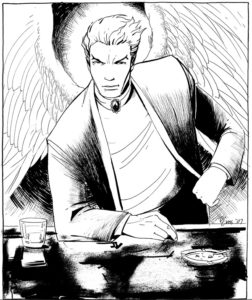
I believe Lucifer on Fox could have been a decent translation of the Vertigo comic, even if the creators of the show had to resort to the familiar police procedural model to appeal to a broader audience. Fox’s Lucifer show could have done the comic justice by having not more Lucifer Morningstar, but less, allowing another character (I suppose Chloe) to take the lead. Imagine, for instance, Lucifer confined to Lux, mostly seated at his grand piano, the Morningstar’s hardhearted bodyguard and personal assistant Mazikeen always at his side, either mute or terse, but an uncomfortable presence either way. Chloe could have initially crossed paths with Lucifer for whatever reason and thereafter frequented Lux on a weekly basis to gain insight from the Devil himself, who, because of his depth of knowledge concerning mortal misdeeds, could provide indirect clues with aloof indifference, yet somehow over and again proving to be incredibly helpful to the frustrated detective. If more Lucifer were required, the audience could spend more time with him and Mazikeen within Lux as the fallen angel broods over his existential angst and explores supernatural prospects of somehow escaping Creation—and thereby escaping the bonds of God’s will. The threat of an impending angelic invasion or various other supernatural dilemmas cropping up on account of his abandonment of Hell’s throne would keep the interest high and leave plenty of doors open for future seasons.

If Fox’s Lucifer were this kind of show, the spirit of the comic book character—namely the princely fallen angel’s élite elegance and aristocratic arrogance—would have been preserved; the storytelling would have been far more intriguing; the one-liners from the misanthropic Lucifer Morningstar would have been far better. The Lucifer show tried to make the Devil debonair and smooth-tongued, but just as spending more and more time among humans made Lucifer increasingly human, it likewise made Lucifer’s sophistication suffer. This Devil was at his most irate in “The Would-Be Prince of Darkness” because of an imposter “diluting the Lucifer brand” on account of his lowbrow indulgence, but throughout the season Lucifer himself proved to be rather lowbrow, what with his frequent references to pop culture and his penchant for petty gossip. I for one would have preferred Lucifer, by virtue of his refinement, to have been icily detached from the human world around him. For instance, it would have been wonderful if Lucifer spoke in such an elegant and eloquent manner that most of the characters, i.e. humans, were unable to keep up with or even understand him (much like Christopher Waltz’s marvelous character Dr. Schultz in Quentin Tarantino’s Django Unchained), which would have helped do justice to the Vertigo character while allowing for plenty of comic relief. Instead, what Fox delivered was an ersatz version of Vertigo’s Lucifer—a mildly mischievous, oversexed, adolescent man suffering from ADHD.
One early review of the Lucifer show considered its star “a bit like a teenage boy with his dad’s Amex,” which is essentially what the show’s writers were going for; indeed, Lucifer showrunner Joe Henderson early on took to referring to Lucifer as “the eternal teenager,” imagining the fallen angel as a rebellious kid booted from his home after quarreling with his father, now rebelling again in the form of a rakish lifestyle, replete with heavy drinking, fancy cars, and loose women. I understand that the Lucifer show had to be more down-to-earth than the Lucifer comic, but Fox brought Lucifer far too down-to-earth, and it proved to make the ultimate rebel more irritating than admirable. Mike Carey’s Lucifer comic had a great deal of levity to it, but the comedic aspects centering on Lucifer in the show made the Morningstar, to be frank, somewhat goofy. Indeed, even when the writers had starring lead Tom Ellis practically recite lines from the source material in “Favorite Son,” Ellis’ Lucifer came off more as a hurt and awkward child than as the titanic personality that bursts off the pages of the Lucifer comics.
The Lucifer show seemed to aspire to elicit sympathy for the Devil by making him essentially harmless and rather pitiful, whereas Mike Carey had the Satanic star of his Lucifer comic demand readers’ admiration—even if rendered begrudgingly—by simply being sublime and grand in his uncompromising independence. The latter, of course, is more in the spirit of the Miltonic-Romantic-Satanic tradition, which is why the Vertigo Lucifer comic is close to my heart in a way the Lucifer show on Fox could never be.
